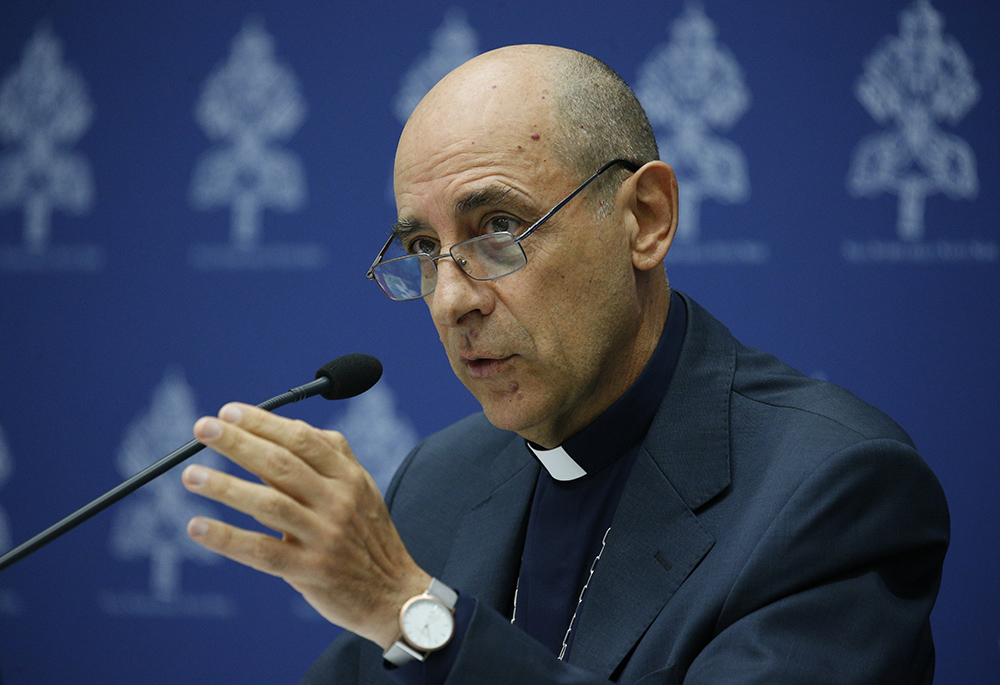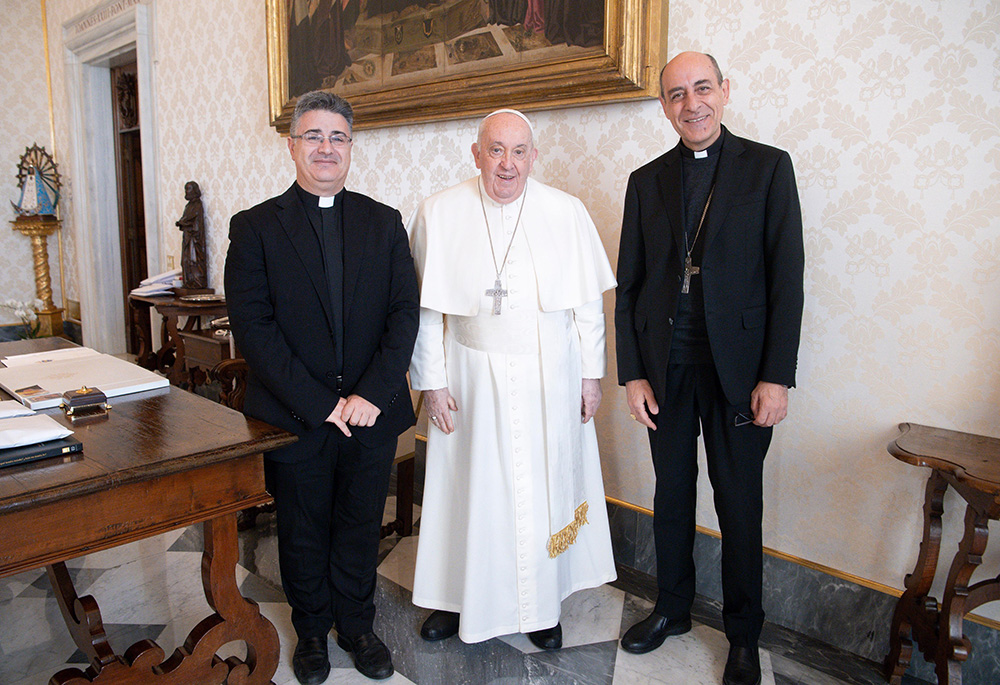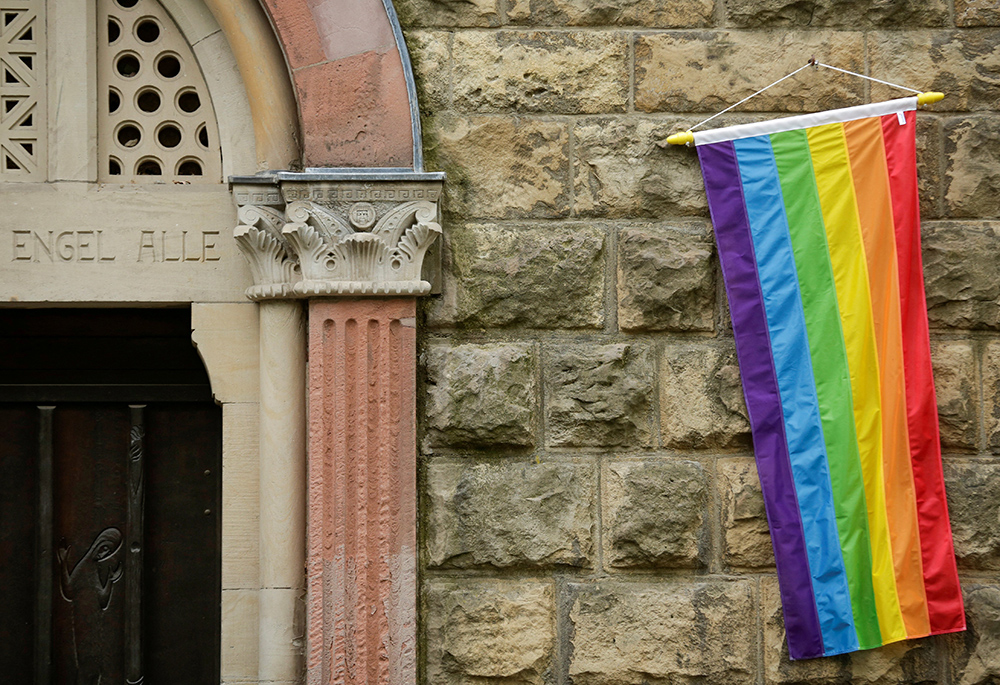
Cardinal Víctor Manuel Fernández, prefect of the Dicastery for the Doctrine of the Faith, speaks to reporters at the Vatican Sept. 19, 2024. The cardinal said on July 3, 2025, that the Catholic Church's approval of blessings of couples in same-sex relationships "will remain" under Pope Leo XIV. (CNS/Justin McLellan)
The Catholic Church's approval of blessings of couples in same-sex relationships "will remain" under Pope Leo XIV, the head of the Vatican's doctrine office told an Italian reporter in a brief interview.
Cardinal Victor Manuel Fernández made the statement in response to a question from a journalist for the Rome-based daily Il Messaggero as he left the Holy See Press Office on July 3.
Fernández's remarks are the clearest indication to date since Pope Leo's election of a likely continuation of Pope Francis' gay-blessings declaration. However, the impromptu interview falls short of an explicit, official statement from the Vatican.
Under Francis, the Dicastery for the Doctrine of the Faith in December 2023 released a document entitled "Fiducia Supplicans: On the Pastoral Meaning of Blessings," which opened the door to church blessings for couples in "irregular" situations, including same-sex relationships.
The document, signed by Fernández and his deputy Msgr. Armando Matteo, and approved by Pope Francis, stressed that such blessings could not take the form of a liturgical rite, and did not imply formal approval of "irregular" unions.
The blessings document generated considerable conservative backlash, and some critics of the late Pope Francis had expressed hope that Pope Leo would rescind or ignore it.

Pope Francis poses for a photo with Msgr. Armando Matteo, left, secretary of the doctrinal section of the Dicastery for the Doctrine of the Faith, and Cardinal Víctor Manuel Fernández, dicastery prefect, during a meeting at the Vatican on Dec. 18, 2023, the date Fiducia Supplicans was released for publication. (CNS/Vatican Media)
Asked on Thursday, July 3, by Il Messaggero whether Leo would backtrack,, Fernández, who had met privately with Pope Leo earlier that same day, responded "I really don't think so — the declaration will remain."
Previously, the most prominent indication of Leo's approach to gay blessings had come in an interview with Cardinal Jean-Claude Hollerich in the Italian Catholic daily La Stampa in May. The cardinal had said that he thought Pope Leo "might re-interpret" the document, but not "abolish" it.
"Pope Leo has said that the church is open to all," said Hollerich, the Jesuit archbishop of Luxembourg who was elevated to cardinal by Francis in 2019. "This is a continuation of the approach of Francis, who used to repeat 'Everyone, everyone, everyone.' "
Released in December 2023, without prior warning or the arrangement of a press conference, Fiducia Supplicans is an approximately 5,000 word document mainly dedicated to reflecting on the theological significance of the act of blessing.
The text distinguishes between formal liturgical blessings and spontaneous, pastoral ones, and says that blessings of the latter kind can be offered to those in same-sex unions or other relationships contrary to Catholic teaching.
The document says that "A blessing may be imparted that ... descends from God upon those who — recognizing themselves to be destitute and in need of his help — do not claim a legitimation of their own status, but who beg that all that is true, good, and humanly valid in their lives and their relationships be enriched, healed, and elevated by the presence of the Holy Spirit."
However, the declaration stresses, such blessings are in no way comparable to marriage: "Rites and prayers that could create confusion between what constitutes marriage — which is the 'exclusive, stable, and indissoluble union between a man and a woman, naturally open to the generation of children' — and what contradicts it are inadmissible."

A rainbow flag is seen on the wall of a Catholic church in Cologne, Germany, May 10, 2021, as the building is open for same-sex couples to receive a blessing. Pope Francis formally approved letting Catholic priests bless couples in same-sex relationships, the Vatican announced Dec. 18, 2023. (OSV News/Reuters/Thilo Schmuelgen)
After the release of the blessings document the Vatican intervened on multiple occasions to clarify its meaning.
Most prominently, in a meeting with the Dicastery for the Doctrine of the Faith, just over a month after the publication of the document, Pope Francis said that the blessings document allows for the blessing not of irregular unions themselves, but of the individuals in them.
What is blessed, the pope stressed, is "not the union, but the persons, naturally taking into account the context, sensitivities, the places where one lives, and the most appropriate ways to do it."
Advertisement
Shortly after the publication of the document, a number of bishops announced that they would not implement it in their dioceses or jurisdictions and some prelates went as far as to call it heresy.
The most high-profile of these was Cardinal Fridolin Ambongo Besungu, archbishop of Kinshasa and president of the Symposium of the Episcopal Conferences of Africa and Madagascar, and part of Pope Francis' Council of Cardinals.
In a letter, Ambongo stressed that the bishops of Africa, despite their "unwavering attachment" to Pope Francis, believed that the blessings outlined in the document "cannot be carried out in Africa without exposing themselves to scandals."
"The African bishops," Ambongo wrote, "do not consider it appropriate for Africa to bless homosexual unions or same-sex couples because, in our context, this would cause confusion and would be in direct contradiction to the cultural ethos of African communities."
Ambongo, who was considered a potential candidate for pope in the conclave that elected Leo, stressed that his letter had received the approval both of Fernández and of Pope Francis.
In an interview weeks later with Italian newspaper La Stampa, Pope Francis described the church in Africa as "a separate case." For Africans, he said, "homosexuality is something ‘ugly' from a cultural point of view; they do not tolerate it."




